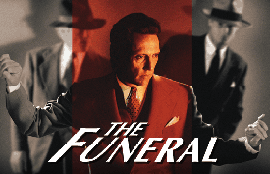


The Funeral
Directed by Abel Ferrara
Featuring: Christopher Walken, Christopher Penn, Annabella Sciorra, Isabella Rossellini, Benicio Del Toro
No matter how you slice it, Abel Ferrara’s films are about conformism, assimilation, the conflicts of identity, and the attempt to maintain relationships as one participates in their undoing. It is not surprising that a few years back he toon on the remake of Body Snatchers. Somewhat different, and in what has become a test genre of sorts for Italian American film-makers, Ferrara’s The Funeral takes on these issues at full force through the mafia film. The story of three brothers (Ray, Chez, and Johnny) and their families, the film opens with Johnny’s funeral. The youngest of the three, we find out that he has been shot by an unknown perpetrator. Ray, the eldest, suspects a rival thug, politician and businessman, mostly for the reason that Johnny was diddling his wife “three times a week.” In flashback, the thug and Johnny are also shown to have ideological differences. Johnny is a member of the Communist Party and is against the strike breaking tactics that the thug has convinced the other two brothers to undertake in their support of him. This is one of the levels at which this film distinguishes itself from most other Mafia films, or just most films’ depictions of Italian men. Richard Gere is quoted as saying that it was “wonderful to have the chance to play a physical, non intellectual individual” by playing an Italian American character in Bloodbrothers. Reviewing The Godfather, it could be said that Michael Corleone was in some way different from the “family,” but it’s important that in Michael is the “American” son. He has fought in World War II, he is a patriotic American whose values are American and an Italian well on his way to assimilation. In the film itself this is represented by his distance from his family, his WASP girlfriend, and by the almost derisive manner in which he recounts to her his family’s habits and their “business.” In fact, within the Godfather series, in the family’s move toward legitimization, Michael comes to represent American capitalism in its most effective manifestation. On the other hand, in The Funeral, Johnny declares his passion for films, talks about books and reading, and has a political conscience. He is a declared anti -capitalist and, by his involvement in the Communist Party, also anti-American. Johnny’s politics seem to be important to his family. When older brother Ray faces down the suspected killer, who lashes out calling Johnny all sorts of names associated with his politics, among which is “anarchist,” Ray is quick to correct him with: “No, my brother was a Communist.” What? What’s this? Italians have political ideas? They participate in politics? What? Aren’t these Mafia louts? What politics, ideals and morals do they have beyond killing and self-importance? Well, fact is that Italians were in fact a most active political community, and that Italian American involvement in union organizing goes beyond their corruption and illegal profiteering. Ray is not quite the animal that even his wife has come to view him as. He demonstrates a certain amount of introspective philosophising energy in arguing with his wife about what is right and wrong. And, he lets go of the first suspect when he comes to believe that he may be innocent. He is almost ready to let go the confessed killer, who says he killed Johnny because he had raped his fiance, until he finds out that he has been lied to. These actions illustrate Ray’s concept of honour, and indicate that it extends beyond himself and his family, to consider its value to those that his family may have dishonoured, and is ready to reach out and forgive. He is also shown to hold some awareness of the contradictions of inter-faction fighting. Feeling a lack of community and solidarity, Ray is moved to say to his rival and first suspected killer: “We should be taking over Ford Motor Co. and instead we’re killing each other.” By offering Ray and Johnny as not wholly unsympathetic characters, I don’t believe that Ferrara means to gloss over the dreadfyl side of organized crime. The balance, or rather imbalance, of the situation is represented in the figure of the third brother, Chez. He is the inherent violent and unpredictable factor in this sort of existence. The potentially dangerous element that will pull everyone down with him through violence and insanity. The strongest impression in the film is made by one of the wives, the oldest brother’s wife Jean (played by Annabella Sciorra). She, as marginal as the other women in the film, expresses most fully the brothers’ relationship with/in organized criminality, but also their self-inscription within a defeating oppressive attitude. She demonstrates a deep knowledge of the mechanisms at work among the men that have defined the patterns of their lives, and correctly recognizes Chez’s (and this business’) penchant for self-destructive violence and defines him as a time-bomb. In addressing Johnny’s girlfriend, Jean tells her: “We ought to be throwing you a party because of this. You ought to be celebrating the fact that you’re not going to become one of their wives. Temples pass themselves off as tough, rugged individuals, and we fall for it. But they’re criminals. They’re criminals because they’ve never risen above their heartless, illiterate upbringing. And there’s nothing, absolutely nothing romantic about it.” Is this the answer to Italian Americans who despise the work of Coppola and Scorsese for their representation of their culture as Mafia-ridden? Not quite, but it could be. I myself don’t agree with the criticism that has been leveled at the above named directors. Ferrara however, goes a little deeper in certain directions with The Funeral, directions that have not quite emerged as efficiently in past Mafia films.
LINKSAntonio Porta site
Verdicchio/Parentheses
ZERO...Writing Arts
AICW Parentheses Verdicchio
GUERNICA EDITIONS Publisher
RITMO ... Italian Hip Hop...Tarantamuffin
Email: pverdicchio@ucsd.edu